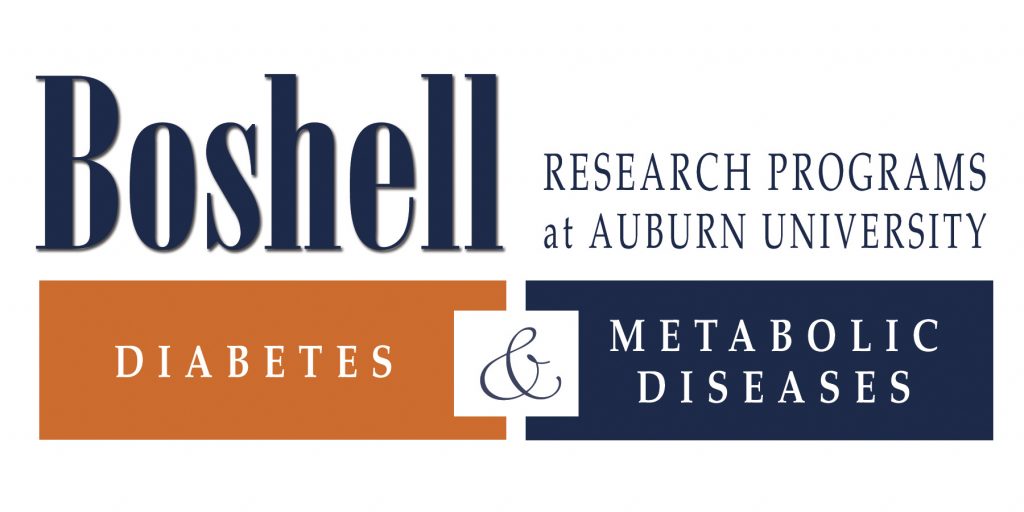The Boshell Diabetes and Metabolic Diseases Research Program enhances opportunities for researchers to advance the prevention, cure and management of diabetes and metabolic diseases and their complications. Through support of diabetes and metabolic disease research opportunities at Auburn University, the program facilitates cross-disciplinary scientific discussion, supporting the study of new ideas, fostering the development of investigators new to the field of diabetes and expanding, the overall base of diabetes investigation.
The Boshell Research Program was established in 2001 through an endowment by the Birmingham-based Diabetes Trust Fund in honor of its founder, Dr. Buris R. Boshell. Dr. Boshell was a 1947 graduate of the Alabama Polytechnic Institute (now Auburn University) in agriculture and attended Auburn Vet Med for two years before transferring to Harvard Medical School to obtain his MD in 1953. He joined the faculty at the University of Alabama at Birmingham Medical Center in 1959 and became chief of the Division of Endocrinology and Metabolism in 1963. During this time, Dr. Boshell established the Diabetes Research and Education Hospital and the Boshell Diabetes and Endocrine Center in Birmingham.
The purpose of the Boshell Research Program is to:
- Develop effective mechanisms through which diabetes researchers at Auburn University may collaborate with each other and outside institutions.
- Support the exploration of new research ideas through a small grants program.
- Foster the development of new investigators through a travel grant program.
- Obtain external funding to support new multidisciplinary investigation and ongoing program activities.
- Develop relationships with community leaders interested in diabetes investigation to increase public support for diabetes programs.
Today, more than 50 investigators from across campus are members of the program and actively involved in diabetes research. Specifically, these investigators are addressing many facets of both type 1 and 2 diabetes, with particular focus on the cardiac, neurologic and metabolic aspects of the disease.

Mission & Vision
The Boshell Research Program mission is to enhance the opportunities for diabetes research at Auburn University by facilitating cross-disciplinary scientific discussion, supporting the study of new ideas, fostering the development of investigators new to the field of diabetes and expanding the overall base of diabetes investigation at the university.
The Boshell Research Program vision is to improve the lives of all people with diabetes through world-class investigation performed at Auburn University into the prevention, cure and management of diabetes and its complications.
Boshell Research Areas of Emphasis
Cardiovascular Disease
Diabetes is a significant risk factor in ≈ 70% of all heart failure-associated mortalities. This is primarily due to myocardial energy dysregulation associated with insulin resistance, which exacerbates the damage from a heart attack and transitions the diabetic heart to failure. Boshell program research in this area is primarily focused on a better understanding of heart failure in diabetic and obese patients, and the utilization of novel therapeutic strategies to treat this.
Alzheimer’s Disease/Neurobiology
Recent studies indicated that type 2 diabetes in midlife is associated with an increased risk of developing Alzheimer’s disease (AD) later in life. However, the underlying mechanism(s) remains unknown. Boshell program research in this area is exploring the genes, molecules, and cellular processes that promote Alzheimer’s disease in obesity and type 2 diabetic patients. Using various physiologically relevant mouse models, cell lines and human postmortem brain tissues (in collaboration with Emory University), our goal is to discover novel agents to disrupt diabetes/obesity and Alzheimer’s disease axis.
Analytical/Technology
The Analytical Core Group holds expertise in microfluidics, small-volume immunoassays, confocal microscopy and fluorescent and electrochemical analysis in secretory samples from cells and in human or animal serum. Supported by the NIH since 2012, this Boshell program research is focused on the utilization of microfluidic systems to match the scale and environment of organized tissues directly related to diabetes and obesity, namely pancreatic islets and adipose tissue. Further integration of this microanalytical expertise with the Auburn University Metabolic Phenotyping Laboratory (AUMPL) is an important goal. Overall, results show that our microanalytical systems, combined with small-volume compatible assays, provide the means to further improve our understanding of the dynamics of endocrine biology.
Nutrition/Metabolism: Faculty within the Boshell program at Auburn University are interesting in defining metabolically appropriate diets and what kinds of diets promote disease. Diets, including the Mediterranean diet or diets using novel sources of omega 3 fatty acids, can be used both in animal and human research to promote health, Alternatively, high fat/high sugar diets can be used to promote insulin resistance and obesity in animal models to explore various treatments and interventions. A central theme of our research is the impact of diet-induced obesity on adipose tissue physiology, and how this newly recognized endocrine organ becomes dysfunctional during obesity development. We are also investigating obesity-induced changes in the gut microbiome as a precipitating event in many obesity-related complications. Utilizing both rodents models and humans (in collaboration with UAB), we are also investigating obesity-induced changes in hepatic fat accumulation and fibrosis.
Cancer
Cancer is among the leading causes of death worldwide. The pathophysiological states associated with obesity-linked metabolic disease are thought to contribute to the initiation and promotion of cancer. Boshell program research is focused on better understanding the mechanistic basis underlying the link between obesity/metabolic disease and cancer, so that new therapeutic targets and the efficacy of therapeutic agents against obesity-linked cancer can be realized.
Auburn University Metabolic Phenotyping Laboratory
Boshell researchers have access to the Auburn University Metabolic Phenotyping Laboratory (AUMPL) led by Dr. Michael Greene. The lab houses an eight cage Promethion Metabolic and Behavioral Phenotyping System purchased from Sable Systems Inc. Capabilities: Mouse or Rat Studies, Food and Water Uptake, Gas Exchange, RQ, Activity Monitoring, Body Mass and Water Loss.
Boshell faculty also collaborate on various projects with the Auburn University Food Science Initiative Obesity Working Group, which is comprised of experts from the Auburn community who specifically focus on obesity and its related health concerns.
Giving Opportunities
If you are interested in providing financial support for research in the Boshell Diabetes & Metabolic Disease Research Program, please contact the Auburn Vet Med Office of Advancement at (334) 844-1274 or giving@vetmed.auburn.edu, or visit them online at vetmed.auburn.edu/giving.
Contact
Dr. Robert Judd
Boshell Program Chair
Dept. Head, Anatomy, Physiology and Pharmacology
109 Greene Hall, Auburn, AL 36849-5518
(334) 844-5416
juddrob@auburn.edu


